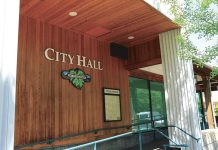Plan to limit growth to 1 percent per year
Healdsburg voters will be asked to loosen growth restrictions next year, after a consensus that the current growth management ordinance stifles the development of apartment complexes and affordable small homes.
The Healdsburg Housing Committee, which has been meeting throughout the year, came to a general agreement Monday night to support an annual growth limit of one percent a year.
With a current housing stock of 4,904 units in the city limits, that comes out to 49 units per year, an increase over the current flat rate of 30 units per year.
The 30-unit limit was approved by Healdsburg voters in 2000 and any modification also must meet voter approval.
The desire to craft a new growth limit that takes into account the complexities of the housing market but is simple enough to be explained in a persuasive ballot argument has dominated the committee’s discussions over details large and small.
A variety of details were discussed and discarded, including a controversial “claw back” provision that would have allowed up to 200 expired allocations from the last 15 years to be recovered.
The “claw back” idea was dropped after the committee agreed that it would be seen as allowing too much growth.
The committee’s recommendations include tying a review of housing allocations to the same cycle as the state-mandated Housing Element, which currently expires in 2023.
If adopted as recommended, the annual allocations would “reset” in 2023 to one percent of the number of dwellings in the community at that time. If 300 new units are built between now and then, bringing the total in the community to 5,200, the new annual allotment would be 52 units.
The committee also discussed a policy of deisgnating a certain percentage of allocations to a certain type of housing – smaller lots and smaller homes that would be affordable to the working class.
The next step in the growth management modification process is to gain approval of the committee’s recommendations by the Healdsburg City Council, which will meet to discuss it at 6 p.m. on Monday, Dec. 21.
If the council accepts the recommendations, the list will be turned over to legal and political consultants, who will craft the proper language for the ballot.
It is unknown whether the issue will appear next year on the June primary ballot or be held until the general election in November.








